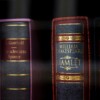“This is what the LORD, the God of Israel, says: ‘Write in a book all the words I have spoken to you.’” – Jeremiah 30:2 (NIV)
I remember as a college freshman seeing a cartoon taped on the door of one of the physics labs in Cornelia Hall at Iona College. It showed a student complaining to his professor, saying, “I really understand the material, I just can’t do the problems.”
It’s not rocket science to understand why GenZers are struggling to do science. It’s as simple as a #2 pencil and a pile of scrap paper—two old-school learning tools that are anathema to the young people now in my chemistry classroom who were born into the Age of the Screen.
In an article from Second Wave Learning, “Has Gen Z Lost Critical Thinking Skills?” the author asks us to imagine we are 21 years old and we’ve always had an app that can tell us the weather, help park the car, discover music we’ve never heard but might like, count our steps, or beep when it’s time to meditate. … “Research suggests that this onslaught of technology is re-wiring the brains of Gen Z.”
And making matters worse, Covid reinforced this phenomenon among many first and second-year college students who spent much of their junior and senior years in high school staring at screens while attempting to do science virtually.
One cannot learn science through osmosis. Magic happens when the brain, eyes, and hand all come together in beautiful synaptic choreography, guiding a pencil across a sheet of paper.
Being blessed with a vivid memory and humorous story-telling skills, I always manage to share with every class the time I was in a Friday night bowling league with my mother. Between frames, I scurried back to my seat to balance a page of very difficult redox reactions my college general chemistry professor had assigned over a weekend. No one is capable of mastering these equations by staring at them.
And now, when I teach this topic to my general chemistry students, I still have to review the process with – yes – a #2 pencil and scrap paper.
This past semester, I recorded the lowest grades ever in an Introductory General Chemistry course—5 Fs, 3 Ds, a bunch of Cs, a few Bs, and only one A. And this was after I had advised several students earlier in the semester to drop the course and take a W because clearly, they weren’t going to survive.
I’m sure they’re sick of me reminding them that when I went to college last century—which always gets a laugh since they think I am exaggerating (I’m not)—we had no internet. There were no laptops and of course no cellphones. Handheld calculators had just been invented and they cost a small fortune. If we needed to look up a physical constant, we had the CRC Handbook of Chemistry and Physics, a tome that required two hands and a healthy back to lift.
And we had lots of #2 pencils and scrap paper—and we were all the better for it.1
So how do I approach a fresh group of incoming 21st-century GenZ-techies with an old-school approach that amounts to “stone knives and bearskins” to quote Mr. Spock from an old Star Trek episode? I remember when my college alma mater, mentioned in the first paragraph, made news in Westchester County, New York as being the first college with campus-wide Wi-Fi. I had long since graduated but the news report captured my interest nonetheless. There was the chairman of the chemistry department, being interviewed on television. Unimpressed, he commented, “Aristotle taught with a stick in the sand…”
From my informal research based on four years of lecture classes coupled with success stories from engaged students, learning science is certainly about students’ attitudes towards learning in general and staying self-motivated and very little about the utilization of technology as teaching aids. Additionally, it comes as no surprise that the students who do the best in my classes take hand-written notes in paper notebooks (or electronic notepads).
The point is: They are writing stuff down.
The concept of copying with precision and accuracy is an old and important one. It brings to mind the scribes who were tasked with copying the manuscripts that have preserved God’s Word. They were the “official scholars of the oral and written law and the instructors and interpreters of it.”2
If there had not been copyists and interpreters, there would have been no transmission of the biblical text. Those who did the work very quickly became authorities on the text. Most of them were probably priests, or linked with priestly groups. With so many complicated materials involved with the transmission of the holy writings, professional, well-trained scribes were absolutely essential.3
I’m not against technology. I utilize Power Points in both lecture and lab classes but I interrupt my lectures to reinforce important concepts by solving problems on a whiteboard or a blackboard (for which I am very thankful we still have here at Palm Beach Atlantic University). In short—I write stuff down.
And although my homework assignments are delivered in an online format that accompanies the textbook, I require that my students solve their homework on paper using a pencil before clicking the correct answer on the screen.
God instructed his leaders, again and again, to write things down: To Isaiah, He said, “Go now, write it on a tablet,” (Isaiah 30:8), and to Moses, “Write this on a scroll as something to be remembered” (Exodus 17:14). God instructs the Israelites to write the law on their doorframes and gates (Dt. 10:2) Proverbs 3:3 and 7:3 tell us that virtue formation and law remembering involve following God’s admonition to write them on one’s heart.
Remembering and learning something in any field, but especially in science, is best accomplished by writing it down!























OH, Dear Gregory–This is what I keep asking my students to do, and why I keep having them do lab notebooks, written Inquiry-based learning sheets, etc., etc. in all my Biology courses, both upper and lower division, majors and non-majors. AND why I ban computers from lecture (only can be used by students with certain disabilities), with everyone else having to take hand-written notes, draw things in their notes I have drawn on the whiteboard, etc., etc.
YES, YES, YES!!!! Thank you for this; I sometimes feel like the current-century “dinosaur” but really, this is all SO true. Gives me the courage to keep on asking my students to do as I ask, and I DO try to point out WHY I have them do these things. At least some finally have that “light-bulb,” epiphany moment, and I then pray the “practice” spreads further out into the rest of the class. Keep on using those #2 pencils and scraps of paper!